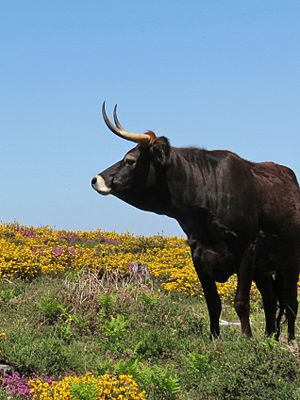Maronesa facts for kids

In the Parque Natural do Alvão
|
|
| Conservation status | FAO (2007): not at risk |
|---|---|
| Other names | Maronês |
| Country of origin | Portugal |
| Distribution | Serra do Marão |
| Standard | Associação de Criadores do Maronês (in Portuguese) |
| Use | draught, meat |
| Traits | |
| Weight |
|
| Height |
|
| Coat | black with reddish dorsal stripe |
| Horn status | horns long, pointing forward and downward |
|
|
The Maronesa is a type of cattle that comes from the mountains of Portugal. It's named after the Serra do Marão mountain range in northern Portugal. For a long time, these cattle were mainly used for pulling carts and farm tools.
Today, the Maronesa breed is considered "not at risk" by the Food and Agriculture Organization (FAO). This means there are enough of them to keep the breed going.
Contents
History of the Maronesa Cattle
Nobody is completely sure where the Maronesa breed came from. Some people think it might have developed from two other Portuguese cattle breeds, the Barrosã and Mirandesa. For a while, it was even considered a mix of these breeds. But by 1835, it was recognized as its own unique breed.
Maronesa cattle used to be found in many parts of northern Portugal. In 1940, there were about 25,000 of them. Their numbers grew to over 32,000 by 1955. However, after that, their population started to drop.
To help protect the breed, a group of farmers started a special association in 1988. They also began keeping a "breed register" to track all the Maronesa cattle. By 1996, nearly 1,500 farmers were raising these animals. In 2008, the breed register became an official "herd-book," which is a detailed record of all the animals in the breed.
What Maronesa Cattle Look Like
The Maronesa is a strong and sturdy type of cattle. There's a clear difference between how male bulls and female cows look.
- Bulls are much larger than cows. They have very strong, muscular necks. Their front parts tend to be bigger and more developed.
- Cows and young male cattle (called bullocks) have a more rectangular body shape.
Most Maronesa cattle are black with a reddish stripe along their back. However, many cows can also be chestnut-brown. They have a pale ring around their nose, and their nose and mouth are black. Their head is wide and short. Their horns are long and grow out horizontally from the head, then point forward and downward.
How Maronesa Cattle Are Used
For a long time, Maronesa cattle were mainly used for draught power. This means they helped farmers by pulling plows, carts, and other heavy equipment.
Since 1996, the meat from Maronesa cattle has been very special. If the animals are raised using eco-friendly methods in certain mountain areas of Portugal, their meat gets a special "DOP status." This means it's a protected product and can be sold as "Carne Maronesa DOP."
Maronesa cattle have also been used in projects that try to bring back the aurochs. Aurochs were a type of wild cattle that lived long ago and are now extinct.
Images for kids
See also
 In Spanish: Maronesa para niños
In Spanish: Maronesa para niños
 | Dorothy Vaughan |
 | Charles Henry Turner |
 | Hildrus Poindexter |
 | Henry Cecil McBay |



